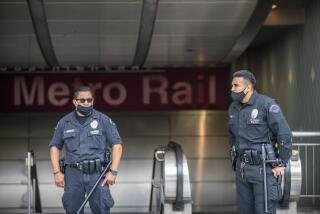Mediation Plan Ends MTA Strike
- Share via
The Metropolitan Transportation Authority and its mechanics union agreed Monday to settle their remaining contract differences through mediation, ending a 35-day transit strike that has left an estimated 400,000 daily passengers without bus or train service.
A few limited bus routes began running Monday night, and partial rail service on the Red Line subway and light-rail Blue Line was expected to resume this morning. Officials said full countywide service would probably not be restored until Friday.
For the record:
12:00 a.m. Nov. 21, 2003 For The Record
Los Angeles Times Friday November 21, 2003 Home Edition Main News Part A Page 2 National Desk 1 inches; 55 words Type of Material: Correction
MTA strike -- An article Tuesday on the front page of Section A about the resolution of the 35-day Metropolitan Transportation Authority mechanics strike incorrectly reported that it was the second-longest transit strike in Los Angeles County history. It was the third-longest. A strike in 1974 lasted 68 days; one in 1976 lasted 36 days.
Negotiators reached a tentative settlement shortly before midnight Sunday after what both sides characterized as several grueling bargaining sessions since Friday.
The agreement was quickly and unanimously approved Monday by the MTA board. It must still be ratified by the Amalgamated Transit Union, Local 1277, which has scheduled a vote for Wednesday. But union President Neil Silver, who is recommending the deal to his members, urged them to go back to work immediately as a show of good faith.
The key sticking point during more than a year of negotiations, the provision of health benefits for active and retired mechanics, remains to be settled. It will be presented now to a panel of three mediators -- one picked by each side, the other chosen jointly -- who will draft a compromise proposal that can be rejected by either side.
That process could take months, officials said, but both sides said they were relieved that transit workers would be going back to work in the meantime.
The strike, they agreed, had resulted in a stalemate.
“There will be a temptation on the part of everybody to assess winners and losers in this,” said county Supervisor Zev Yaroslavsky, the MTA board chairman. “Let’s stipulate right now that everybody was a loser in this strike ... above all the 400,000-plus riders who depend on the MTA.... They have suffered the most. They have had their lives turned upside-down. It has been a disaster for them.”
Silver said the strike was necessary because his union needed to fight for health benefits that it contends were being threatened. “I’m sorry the strike happened, but I don’t apologize for it. I am glad it is finally coming to an end.”
The union administers a $17-million annual health fund, financed by the MTA, that it uses to pay for its members’ medical insurance. The fund is nearly insolvent, due to rising health-care costs -- and, in the MTA’s view, to poor management.
During the strike, the MTA offered to increase its annual support of the health fund to $22.6 million by 2005, the last year of the contract. The union requested $27.6 million.
Most of the difference involves the cost of care for retirees. The union wanted monthly contributions for retirees younger than 65 to rise incrementally, to $909 by late 2005, from the current level of $533. The MTA insisted on freezing retirees’ benefits at $533 a month during the entire contract. The two sides also differed on the size of a contribution for supplemental Medi-gap policies for retirees older than 65.
Silver said that the issue of retiree benefits would probably be the most contentious one for the mediators. “People on fixed incomes,” Silver said, “we’re fighting for them.”
The two sides persisted in calling the upcoming process nonbinding arbitration, although it is much closer to mediation, in which an outside party considers opposing viewpoints and drafts a compromise.
The panel’s decision will be nonbinding, meaning that each party in the dispute will have the ability to turn it down by a two-thirds board vote. The union will have the right to strike again if the deal is thrown out.
Los Angeles City Councilman Antonio Villaraigosa, an MTA board member, said he thought that a deal on health benefits could be reached without outside help because the two sides are talking again.
“I said from the beginning that the only way to come to agreement was in face-to-face negotiations,” Villaraigosa said. “Now that we have the momentum, I’m hoping we can get the whole thing finished” without arbitration.
The strike began Oct. 14 and essentially shut down the nation’s third-largest transit system. MTA drivers, clerks and supervisors honored the mechanic’s picket lines, bringing MTA bus, subway and light-rail service to a halt. The strike was the second-longest transit work stoppage in Los Angeles history.
The MTA had proposed giving mechanics a 3% wage increase plus a flat increase of 81 cents an hour accumulating quarterly throughout a three-year, nine-month deal.
While Silver would not comment on the wage package included in Monday’s tentative agreement, sources said it includes a 2% wage increase retroactive to 2002, when the union’s last contract ran out, and 2.5% increases in 2004 and 2005.
MTA officials, who drew a hard line during the strike and said repeatedly they would not increase their offer, said they were paying slightly more than they had wanted but that they could live with the deal.
“It’s not all we wanted.... There are things we would like to have that we didn’t get,” said Duarte City Councilman John Fasana, an MTA board member. “But economically we are still within the parameters of what we were seeking. The real differences are in the health care, and that’s something we will have to see about.”
At a City Hall news conference after he flew back from the inauguration of Gov. Arnold Schwarzenegger, Mayor James K. Hahn expressed support for the tentative agreement.
“Today’s announcement regarding the end of the transit strike is great news for Los Angeles transit users as well as everyone who uses our streets and highways,” Hahn said, adding that even nonbinding arbitration is going to be “morally compelling on both parties to accept.”
On the picket lines Monday there was a palpable sense of relief when the settlement was announced.
“It’s been a long time and at this point, we really just want to go back to work,” said Don Regis, a veteran mechanic who works at a San Fernando Valley bus yard.
Regis said health care remains a particular concern to him because his wife, Mary, has breast cancer. But he and his colleagues have also wanted to see the strike end because of what it has done to riders.
“A big part of why we want to go back is for them,” Regis said. “We’ve seen them walking, the ladies with the kids at their sides and grocery bags in both hands, walking down San Fernando Road all by themselves. They would normally be on our buses and it has been really hard to see.”
Several riders expressed relief.
“I’m so glad it’s over,” said Pasadena City College student Chantale Papouloute. “I had to miss many classes because sometimes I couldn’t get anyone to pick me up.”
Retail salesman Jim Stryjecki, who doesn’t own a car, said he had “been riding my bike to work, six, seven miles each way. At least I’m in good shape now.” Jimmy Taylor, a student at Los Angeles City College and a welfare recipient, said: “It’s great that it’s over.” But, he said, “I have to say when it was on, the welfare office has been empty. You didn’t even have to wait in line there.”
Early in the conflict, MTA officials tried to lay blame for the strike on Silver, who faces a union election later this month. MTA officials said Silver was trying to curry favor within his union by taking on the transit agency.
They also chided him for not taking a contract offer to his rank-and-file for a vote. When the agency broke off talks in late October and sent a “last, best and final” contract offer directly to union members, Silver agreed to hold a vote. The union overwhelmingly rejected the offer Nov. 7.
On that day, the dynamic of the strike changed dramatically. Not only did the union vote bolster Silver and send the MTA back to the drawing board, but a Los Angeles County Superior Court judge ruled that Los Angeles Mayor James K. Hahn and three other MTA board members could get involved in the negotiations.
The four returning board members -- Hahn, Villaraigosa, county Supervisor Gloria Molina and City Councilman Martin Ludlow -- had been barred from talks because they had taken too much union money during political campaigns.
Hahn and the two city councilmen, all friendly to labor, immediately injected a new sense of energy in the talks. When the union called for binding arbitration to settle the deal, the three lawmakers publicly stated their support.
That support didn’t waver when the MTA countered by asking the union to go back to work. Both sides said Monday that Villaraigosa in particular played a key role as a go-between with the union and the MTA. “He was the peacekeeper,” Silver said. “He kept it moving when things started to fluff off.... He focused the conversation.”
While the mechanics are going back to work, the MTA clerks union and the 5,000-member bargaining unit representing its drivers remain engaged in their own difficult contract talks with the MTA. On Sunday, Ludlow and Miguel Contreras, executive secretary-treasurer of the Los Angeles County Federation of Labor, tried to work out a deal with drivers at the union’s Irwindale headquarters.
The union has said it would do all it could to avoid a strike, but that a walkout is at least a slight possibility.
“It makes me uncomfortable that the drivers are still trying to get a deal,” Contreras said. “I am concerned about what is going on at the MTA because after over a month we really only have a half a deal with the mechanics and the drivers are still hanging out there.”
*
Times staff writers Patrick McGreevy and Michael Krikorian contributed to this report.
More to Read
Sign up for Essential California
The most important California stories and recommendations in your inbox every morning.
You may occasionally receive promotional content from the Los Angeles Times.














